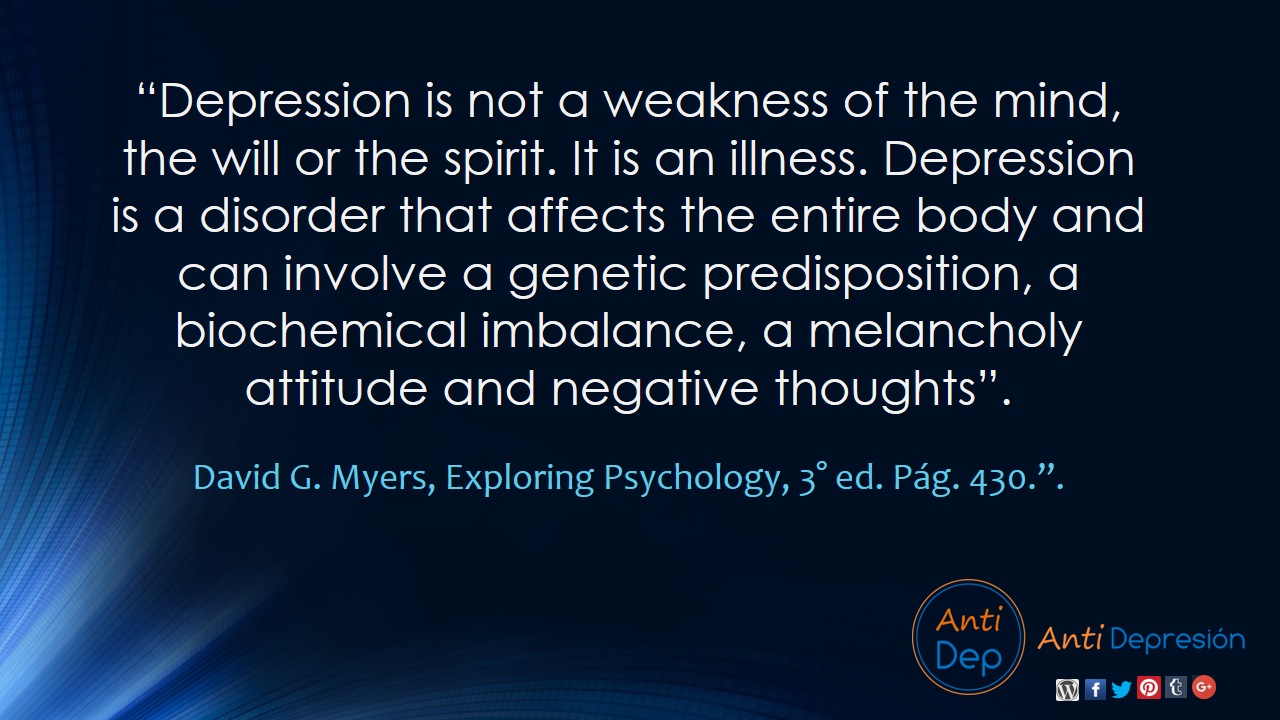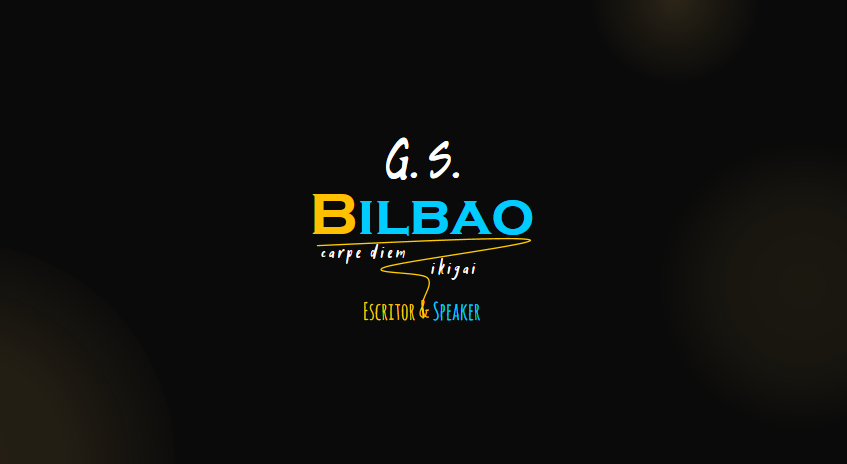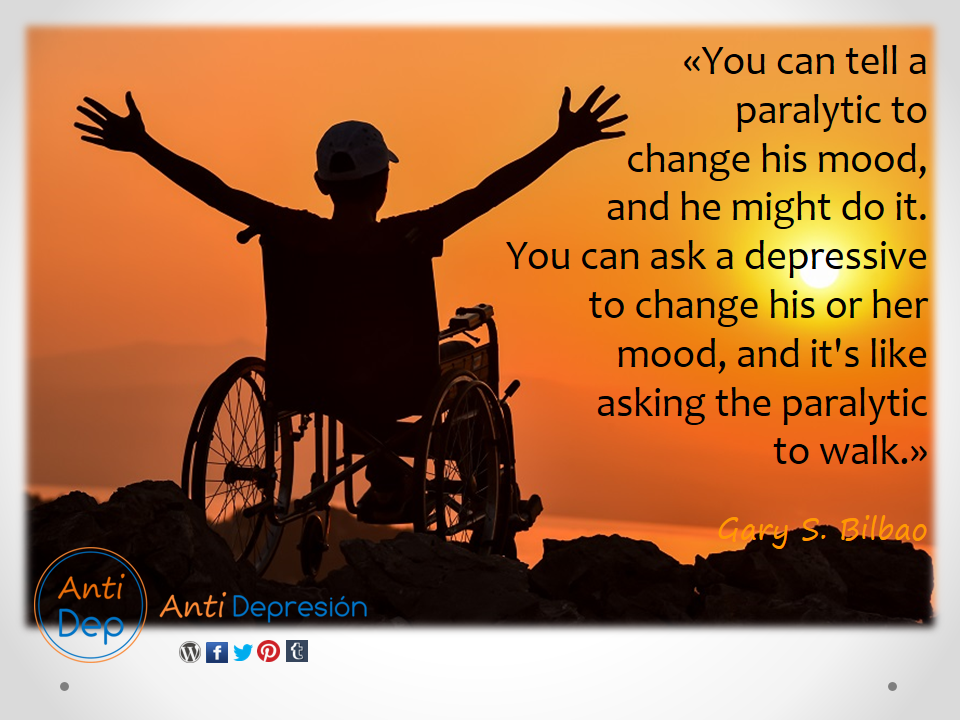https://files.peakd.com/file/peakd-hive/garybilbao/3DCs30pD-paralitico20depresion20ingles.png
Sorrow is an emotion present in all human beings, as can be fear and joy, anger and a host of other emotions. We all have the right to feel "deprecated" at some time and for some days, even. The problem lies when that sadness is present daily or daily for two weeks or more, in that case, and adding other symptoms, it can be determined if there is a depressive disorder. And according to the levels of intensity it is diagnosed if it is mild, moderate or severe.
The term "depression" is derived from the Latin depressus, meaning down or out. The Royal Spanish Academy defines it as a "syndrome characterized by deep sadness and inhibition of the psychic functions present in the affected person. When you place the word "depression" in the Google search engine the following concept will appear: > "A mental illness or disorder characterized by deep sadness, mood swings, low self-esteem, loss of interest in everything and diminished psychic functions". This definition is quite complete, in spite of its simplicity, since, in a few words, it summarizes everything that being depressed implies, because as we said at the beginning, it is not to be "depressed" or to have a passing sadness; depression is more than that and one of the aspects to emphasize of the concept that Google throws to you, is that it uses the word "disease", and that is what the true depression is, a disease, a quite serious disorder. As I mentioned earlier, depression is an illness, and more common than you might think. According to the World Health Organization (WHO), it is estimated to affect over 350 million people worldwide. And also adds the page of this organism what we mentioned at the beginning of this post, that > "Depression is different from the usual variations in mood and short emotional responses to the problems of everyday life". It is one thing to be sad about the loss of a loved one, a pet, a love affair or losing a job, but it is quite another to be sad every day or every day for two weeks or more and to suffer most or all of the symptoms that accompany deep sadness. Another concept or definition of depression that we find on the WHO website is the following: > "Depression is a common mental disorder, characterized by the presence of sadness, loss of interest or pleasure, feelings of guilt or lack of self-esteem, sleep or appetite disorders, feelings of tiredness and lack of concentration". The depression can get to become chronic or recurrent, and to make difficult sensibly the performance in the work or the school and the capacity to face the daily life. In its most severe form, it can lead to suicide. If it is mild, it can be treated without medication, but when it is moderate or severe, medication and professional psychotherapy may be needed. ---

--- Depression is much more serious than a small bout of despair; it is a devastating emotional illness that greatly reduces the ability to function normally. Dr. Andrew Slaby explains it this way: > Imagine the most intense physical pain you've ever experienced, a broken bone, a dental problem, or childbirth, multiply it tenfold, and subtract the cause. Finally, another concept that we can mention is that depression is presented as a set of symptoms of predominant affection (pathological sadness, apathy, anhedonia, hopelessness, decay, irritability, subjective feeling of discomfort and helplessness in the face of the demands of life) although, to a greater or lesser extent, symptoms of a cognitive, will and somatic type are also present, so that one could speak of a global psychic and physical affectation, making special emphasis on the affective sphere. This last definition highlights something very important and with it we can conclude this article, depression is a sadness, yes, of that there is no doubt, but it is a pathological sadness, that is to say, it is sickly, that has causes, symptoms and evolution like any illness and as such it must be treated. In subsequent articles, I will offer information on the different types of treatment for depression. --- ###### Depression is preventable, treatable and surmountable, I have always trusted that premise. If you feel identified with some of the definitions or symptoms of depression the most recommendable thing is to seek professional help to get it treated. Depression ruins your quality of life, it can even lead you to consider ending it. While I propose a system with 7 vital areas to fight it. I have already expanded on this topic in [a previous publication](https://hive.blog/hive-120078/@garybilbao/how-to-prevent-and-overcome-depression-integral-anti-depression-system). This I suggest, more than a system of prevention and treatment, is a lifestyle. ###### -***S*** support: never forget to give it diligently and to receive it with gratitude. ##### -***N*** ature: have contact every day with water, sunlight and pure air and maintain, within your possibilities, a healthy and balanced nutrition. ###### -***T*** reatment: if you are diagnosed with clinical depression, enjoy the benefits of psychotherapy and the relevance of psychiatric treatment. ##### -***E*** motional and cognitive intelligence. Fundamental to regulate and manage our emotions and thoughts. ###### -***F*** un and humor: never, but never stop laughing, entertaining and enjoying yourself. Laughter and good humor are medicinal and beneficial for everything. ###### -***E*** xercise: stretching, dancing, calisthenics, fitness. Anything, but exercise. It's vital for your body and emotions. ###### -***P*** eace, rest, relaxation: do yoga, breathing, meditation, prayers, rest, massage. Seek mental and physical balance, that reduces stress and anxiety. --- Life is beautiful, don't lose hope. Live it to the fullest. Every day is a new opportunity. An antidepressant and motivating hug. ---- --- --- ---
**Image source:** Own design. The sentences correspond to their authors. --- --- ####
Bibliographic and internet references: * http://www.who.int/mental_health/management/depression/es/ * http://www.who.int/mediacentre/factsheets/fs369/es/ * You can beat depression, Priorities for Today Magazine, Year 4 - May 2008. Pág. 4. Inter-American Publishing Association (APIA). * Help for Depressed Teens, Awake! September 08, 2001. Vol.82, No. 17. Watch Tower Bible and Tract Society of Pennsylvania. * Clinical Practice Guideline Working Group on Managing Depression in Adults Clinical Practice Guidance on Managing Depression in Adults. Ministry of Health, Social Services and Equality. Galician Agency for the Evaluation of Health Technologies (avalia-t); 2014. Clinical Practice Guidelines in the NHS: Avalia-t 2013/06. --- --- --- ####
**G. S. Bilbao**
```Blogger | Conferencista | Locutor Comercial```
---
https://files.peakd.com/file/peakd-hive/garybilbao/87FAQixQ-GIF20de20Hive.gif
#####
THANK YOU FOR YOUR READING, VOTING AND COMMENTING!
--- ---

---
https://files.peakd.com/file/peakd-hive/garybilbao/3rsGDkq1-GIF20HIVE20Venezuela.gif
--- ###
You can find me on my social networks:


 ###
[My Wordpress Blog](https://gsbilbao.wordpress.com/)
--- ---- ###
You can also read this post in my blog ##
[AntiDepresión](https://antidepresion.wordpress.com) ---- ######
###
[My Wordpress Blog](https://gsbilbao.wordpress.com/)
--- ---- ###
You can also read this post in my blog ##
[AntiDepresión](https://antidepresion.wordpress.com) ---- ######
This publication is one more contribution of my personal project to help people prevent and overcome clinical depression. You can visit the project's blog and social networks and enjoy more content: (in spanish)
**Facebook:** https://www.facebook.com/AntiDepresionLA **Instagram:** https://www.instagram.com/antidepresion1/ ---


Originally posted here: https://hive.blog/hive-120078/@garybilbao/what-is-depression-concepts-and-definitions





 ###
###

No comments:
Post a Comment